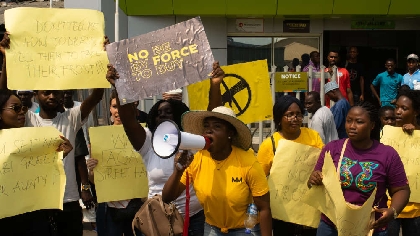
For many young women in Port Harcourt, shopping at bustling markets like Mile 1 has become a distressing experience.
It’s not just the chaos of haggling or navigating narrow aisles — it’s the persistent, unwelcome attention from male traders.
“I shouldn’t have to brace myself for groping just to buy clothes,” says Chisom (not real name) a shopper seen at the market.
“We’re tired of this being our reality,” Chisom says. “It’s degrading.”
Her sentiment is echoed by Amaka Nwankwo, (real name withheld) another shopper. “Harassment has become normal here,” she says. “The catcalls, the unsolicited touches — it makes you feel like prey.”
The women recall incidents of traders not only invading their personal space but also retaliating with insults when called out. “When you tell them to stop, they laugh or mock you, sometimes even louder,” Teni(not real name), another shopper, shares.
“You can’t walk through the market without someone grabbing you or calling you names,” she says, her frustration palpable.
Amaka avoids wearing certain clothes to the market, not out of preference, but fear.
“I feel unsafe,” she says.
Across Port Harcourt, young women are speaking up against the widespread harassment in busy markets. Groping, catcalling, and unsolicited advances from traders are so common they’ve become an expected part of the market experience.
“We just want to shop in peace,” says Teni “These men need to understand that their behavior is not acceptable. It’s not playful—it’s violating.”
Some traders dismiss the harassment as playful.
Globally, harassment in public spaces affects millions of women. According to UN Women, nearly 90% of women surveyed in urban areas across the world reported experiencing harassment at least once. Data from the National Bureau of Statistics shows that 30% of Nigerian women face physical or sexual violence, with harassment in markets and other public spaces contributing significantly to this figure.
The rate of gender-based violence (GBV) is increasing, and the south-south zone of Nigeria has a higher rate of violence at 52%, according to OXFAM data.
The Mile 1 market’s Vice Chairman, Tadeus Nwaibeh, acknowledges the issue. He condemned the actions of those who harass women. “We don’t condone this behavior,” he asserts. “Anyone caught groping or acting violently toward women will face fines and potential arrest.”
Mr. Nwaibeh highlights efforts by the market leadership to maintain order. “We are working to ensure the market is a safe and welcoming place for everyone, especially women. It’s our responsibility to protect them as they shop and trade.”
Legal frameworks exist to protect women, says Adata Bio-Briggs, the Rivers State Chairperson of the International Federation of Female Lawyers (FIDA), expressing concern about the gap between laws and enforcement.
“Under the Violence Against Persons Prohibition (VAPP) Act, actions like groping or stalking are punishable,” Bio-Briggs explains. “Yet, cultural and systemic barriers make it difficult for women to seek justice.”
Hilda Desmond-Ihekaire, Chairperson of the Nigerian Bar Association (Ahoada Branch), agrees.
“These behaviors must be condemned by all,” she says. “Sensitization campaigns are critical, especially in markets, to educate traders on the legal implications of harassment.”
Both lawyers emphasize that laws alone are not enough. Women must feel empowered to report such cases without fear of stigmatization or retaliation.
Marketplaces are more than just economic hubs—they are cultural touchstones, bustling with activity and serving as lifelines for local communities.
But their safety and inclusivity must not be overlooked.
Desmond-Ihekaire and Bio-Briggs call for immediate action:
Educational programs: Regular market-wide sensitization to teach traders about the dignity and rights of women.
Enforcement: Clear consequences for offenders, ensuring laws are not just words on paper.
Support systems: Creating channels for women to report incidents anonymously and safely.
The voices of young women like Amaka and legal advocates like Bio-Briggs and Desmond-Ihekaire are converging at a crucial moment.
The 16 Days of Activism against Gender-Based Violence started on Monday with the International Day for the Elimination of Violence against Women and will run through December 10, which is Human Rights Day.
“Markets are for everyone,” Teni says. “If they aren’t safe for women, they aren’t safe for anyone.”


